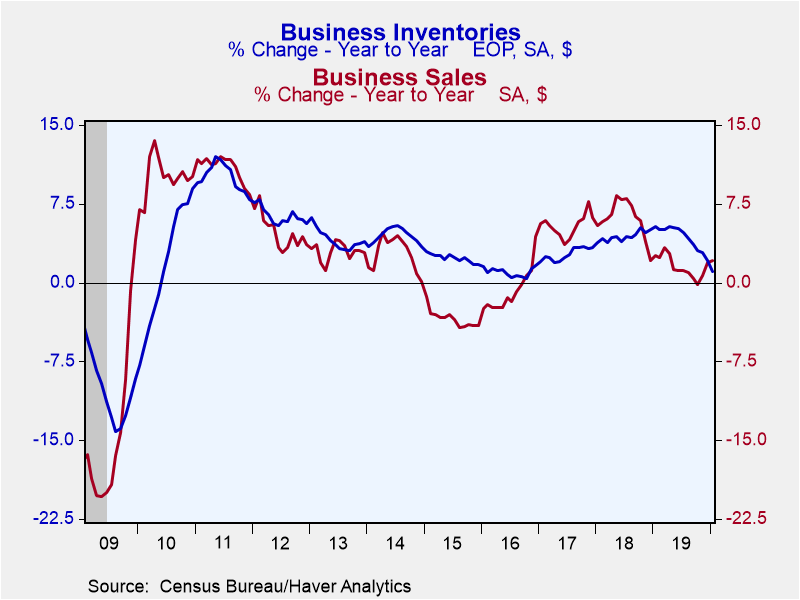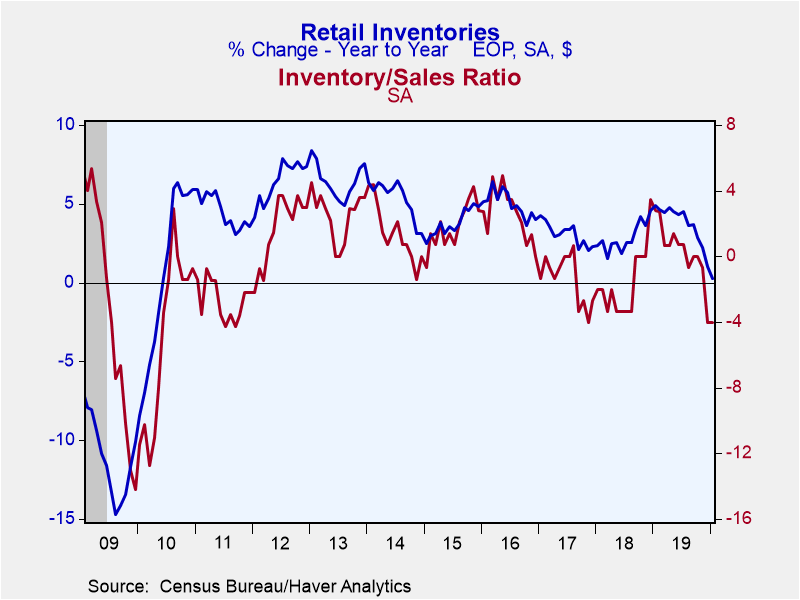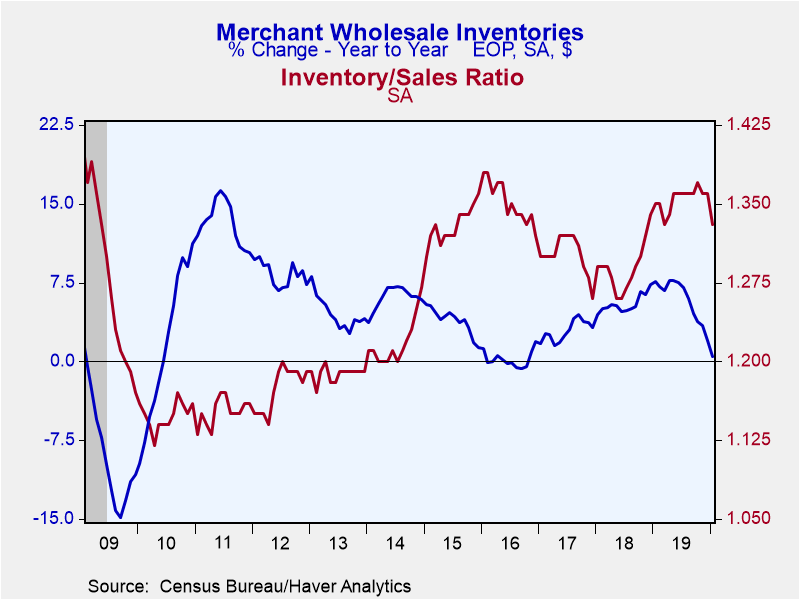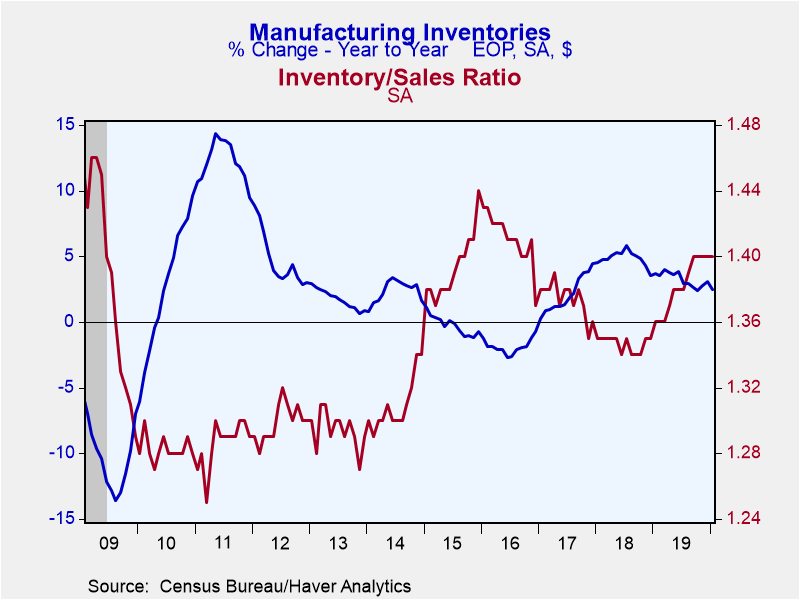 Global| Mar 17 2020
Global| Mar 17 2020U.S. Business Inventories Ease in January While Sales Strengthen
by:Tom Moeller
|in:Economy in Brief
Summary
Total business inventories slipped an expected 0.1% (+1.1% y/y) during January following an unrevised 0.1% December gain. The anticipated figure is from the Informa Global Markets survey. Business sales increased 0.6% (+2.1% y/y) [...]
Total business inventories slipped an expected 0.1% (+1.1% y/y) during January following an unrevised 0.1% December gain. The anticipated figure is from the Informa Global Markets survey. Business sales increased 0.6% (+2.1% y/y) following a 0.1% improvement. The rise in sales relative to the inventory decline lowered the inventory-to-sales ratio to 1.38, its lowest point since March of last year.
Retail inventories held steady (0.3% y/y) in January after falling for two months. Motor vehicle dealers' inventories declined 0.6% in January (-2.2% y/y), down for the fourth straight month. Nonauto inventories rose 0.3% (1.7% y/y) after holding steady in December. Inventories of furniture & home furnishings rose 0.5% (-2.6% y/y) following two months of decline. Clothing inventories were off 0.2% (-2.0% y/y), down for six straight months. General merchandise store inventories rose 0.4% (-1.4% y/y) but department store inventories increased 0.7% (-6.3% y/y), the first increase in four months. Wholesale inventories fell 0.4% (+0.4% y/y) after a 0.3% decline. Factory sector inventories eased 0.1% (+2.5% y/y) after a 0.4% strengthening.
Sales at retail stores (not including food services) strengthened 0.6% (4.7% y/y) after easing 0.1% in December. Excluding auto dealers, retail sales improved 0.5% (4.1% y/y) after rising 0.4%. Wholesale sector sales surged 1.6% (2.2% y/y), the largest rise since last March. Shipments from the factory sector declined 0.5% (-0.4% y/y) and reversed December's increase.
The inventory-to-sales ratio in the retail sector declined to 1.42, the lowest level since November 2014. The ratio for retailers excluding auto dealers held steady at 1.18, down from the March 2016 high of 1.29. For merchant wholesalers, the I/S ratio fell to 1.33, a ten-month low. Conversely, the factory sector I/S ratio was steady at 1.40, the highest level since November 2016.
The manufacturing and trade data are in Haver's USECON database.
| Manufacturing & Trade | Jan | Dec | Nov | Jan Y/Y | 2019 | 2018 | 2017 |
|---|---|---|---|---|---|---|---|
| Business Inventories (% chg) | -0.1 | 0.1 | -0.2 | 1.1 | 2.1 | 5.1 | 3.4 |
| Retail | 0.0 | -0.1 | -0.9 | 0.3 | 1.0 | 4.5 | 2.3 |
| Retail excl. Motor Vehicles | 0.3 | 0.0 | -0.3 | 1.7 | 1.9 | 1.8 | 2.0 |
| Merchant Wholesalers | -0.4 | -0.3 | 0.1 | 0.4 | 2.0 | 7.3 | 3.3 |
| Manufacturing | -0.1 | 0.4 | 0.3 | 2.5 | 3.1 | 3.5 | 4.5 |
| Business Sales (% chg) | |||||||
| Total | 0.6 | 0.1 | 0.5 | 2.1 | 1.5 | 6.1 | 5.4 |
| Retail | 0.6 | -0.1 | 0.3 | 4.7 | 3.4 | 4.6 | 4.5 |
| Retail excl. Motor Vehicle | 0.5 | 0.4 | -0.1 | 4.1 | 3.2 | 5.3 | 4.8 |
| Merchant Wholesalers | 1.6 | -0.2 | 0.9 | 2.2 | 0.7 | 6.7 | 6.7 |
| Manufacturing | -0.5 | 0.5 | 0.3 | -0.4 | 0.7 | 6.9 | 5.0 |
| I/S Ratio | |||||||
| Total | 1.38 | 1.39 | 1.39 | 1.40 | 1.40 | 1.36 | 1.38 |
| Retail | 1.42 | 1.43 | 1.43 | 1.48 | 1.45 | 1.45 | 1.47 |
| Retail excl. Motor Vehicles | 1.18 | 1.18 | 1.19 | 1.21 | 1.19 | 1.20 | 1.24 |
| Merchant Wholesalers | 1.33 | 1.36 | 1.36 | 1.35 | 1.35 | 1.29 | 1.30 |
| Manufacturing | 1.40 | 1.40 | 1.40 | 1.36 | 1.38 | 1.35 | 1.37 |
Tom Moeller
AuthorMore in Author Profile »Prior to joining Haver Analytics in 2000, Mr. Moeller worked as the Economist at Chancellor Capital Management from 1985 to 1999. There, he developed comprehensive economic forecasts and interpreted economic data for equity and fixed income portfolio managers. Also at Chancellor, Mr. Moeller worked as an equity analyst and was responsible for researching and rating companies in the economically sensitive automobile and housing industries for investment in Chancellor’s equity portfolio. Prior to joining Chancellor, Mr. Moeller was an Economist at Citibank from 1979 to 1984. He also analyzed pricing behavior in the metals industry for the Council on Wage and Price Stability in Washington, D.C. In 1999, Mr. Moeller received the award for most accurate forecast from the Forecasters' Club of New York. From 1990 to 1992 he was President of the New York Association for Business Economists. Mr. Moeller earned an M.B.A. in Finance from Fordham University, where he graduated in 1987. He holds a Bachelor of Arts in Economics from George Washington University.
More Economy in Brief
 Global| Feb 05 2026
Global| Feb 05 2026Charts of the Week: Balanced Policy, Resilient Data and AI Narratives
by:Andrew Cates










